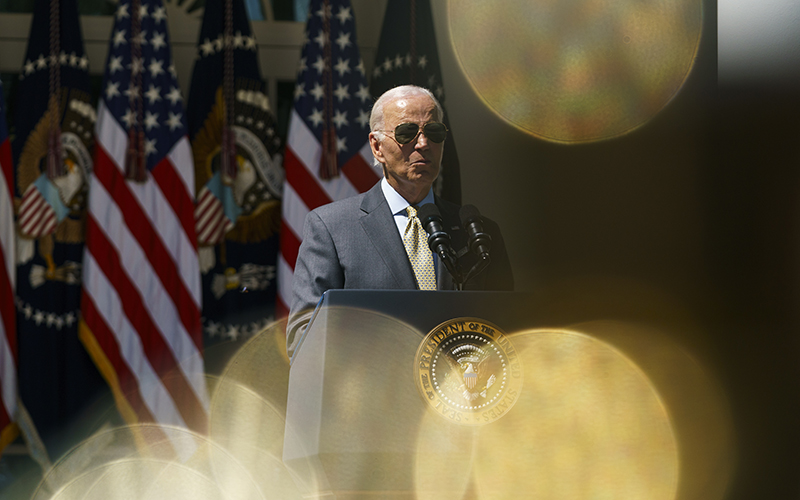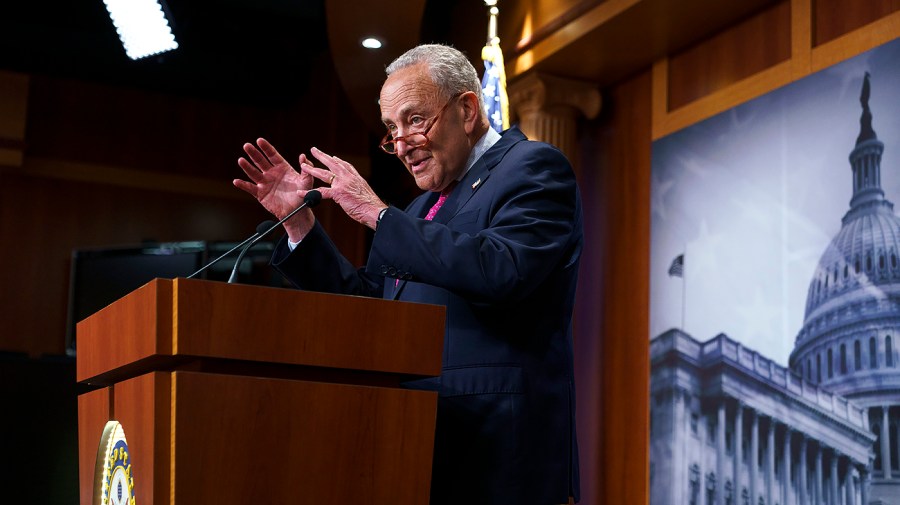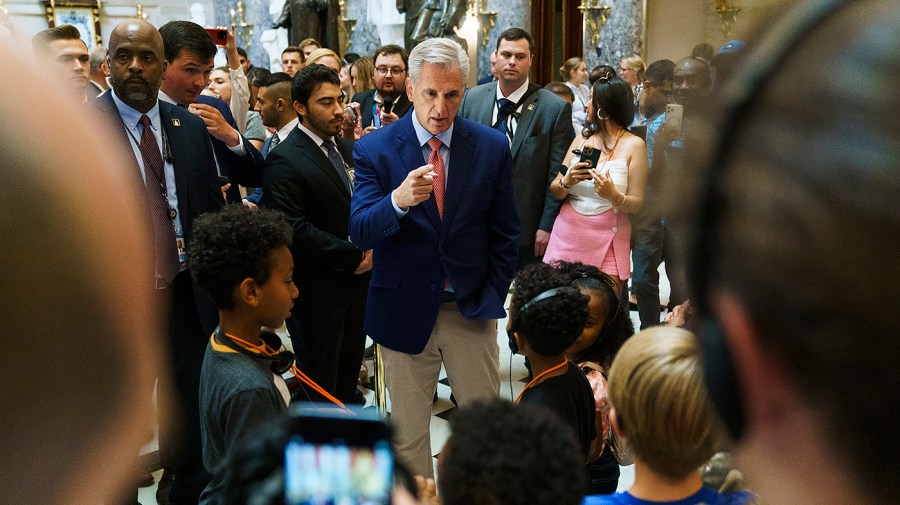White House seeks to go on offense after difficult August
The White House intends to use the danger of a government shutdown and the House GOP’s growing hunger for impeaching President Biden to go on offense this fall after a difficult August.
Congress has until the end of September to agree to a government funding measure, but House Republicans appear to be divided over the best way forward.
While the House, Senate and Biden agreed earlier this year to a deal to raise the debt ceiling, conservatives have since balked at the spending levels set by that agreement.
Funding for Ukraine is generally an area of bipartisan agreement, but a minority of House Republicans also want to cut it off while using the September deadline as leverage.

President Biden discusses the August jobs report in the Rose Garden of the White House in Washington, D.C., on Sept. 1. 187,000 jobs were added in the month of August and the unemployment rate rose to 3.8 percent according to the Department of Labor. (Greg Nash)
And then there’s the talk of an impeachment inquiry for Biden, which Rep. Marjorie Taylor Greene (R-Ga.) on Thursday linked to the funding battle, saying she wouldn’t back keeping the government open without an inquiry vote. She put other conditions on her vote, including ending funding for Ukraine and eliminating coronavirus-related mandates.
The White House pounced on Greene’s remarks, seeing an opportunity to tie the House GOP to one of its more controversial members and take the higher ground.
“The last thing the American people deserve is for extreme House members to trigger a government shutdown that hurts our economy, undermines our disaster preparedness, and forces our troops to work without guaranteed pay,” White House spokesperson Andrew Bates said.
Biden endured a difficult August during which he often ceded the political stage to former President Trump’s legal battles and the GOP presidential race. He was criticized over high gas prices and for being too passive in his reaction to the devastating wildfires in Maui, which Republicans used as an opening to hit him for being out of touch.

A fan takes a photo with U.S. Rep. Marjorie Taylor Greene, R-Ga., during former president Donald Trump’s Save America rally in Perry, Ga., on Saturday, Sept. 25, 2021. (AP Photo/Ben Gray)
The White House has also had to deal with the rat-a-tat-tat of repeated House GOP missives on Hunter Biden after the Department of Justice appointed a special counsel in a surprise move that deepened the investigation of the president’s son, who weeks earlier had looked set to secure a plea deal.
It’s left Biden in a familiar place: low approval ratings and out of the center of the news cycle.
But the response to the Thursday night statement from Greene suggests the White House thinks it can regain political momentum while putting Republicans on the back foot by accusing the GOP of leading the U.S. into a shutdown and focusing more on political games than running the country.
“Even just the discussion of this alone has really highlighted the dysfunctionality of their conference,” former Rep. Joe Crowley (D-N.Y.) said. “[The House GOP is] in a lose-lose situation. If the government does shut down, they’re the party in charge in the House. The president takes some of the blame for just about everything, but you can’t blame for them not giving him a bill.”
Top Stories from The Hill
- Trump’s mug shot becomes valuable commodity for ex-president
- Did Putin kill Yevgeny Prigozhin? Probes show Russians are skeptical
- Giuliani hits new low with Georgia indictment
- Five under-the-radar races to watch this year
The president Thursday called for a short-term continuing resolution (CR) to fund the government. He is also asking Congress to approve $16 billion in disaster relief funding in the wake of the Maui wildfires and Hurricane Idalia after he faced backlash for being on vacation during the wildfires and responding “no comment” when asked about the death toll — a response that the White House later said was because he didn’t hear the question.
Senate Majority Leader Chuck Schumer (D-N.Y.) has also called for a CR and said in a letter Friday that Americans should blame Republicans if a shutdown happens.
“When the Senate returns next week, our focus will be on funding the government and preventing House Republican extremists from forcing a government shutdown,” he wrote. “[W]e cannot afford to jeopardize that progress because MAGA Republicans want to play political games.”

Majority Leader Chuck Schumer (D-N.Y.) following the passage of the Fiscal Responsibility Act on Thursday, June 1, 2023. (Greg Nash)
Biden this week took his own dig at House Republicans for flirting with the idea of a shutdown when he was questioned on his level of concern with the situation.
“It would be a serious, serious problem. I’m hoping that there’s greater maturity to prevent that from happening than some think,” he said.
While the White House is pushing out that Republicans are focused on the wrong priorities, Speaker Kevin McCarthy (R-Calif.) is emphasizing to his conference that if the government shuts down, investigations into the Biden family and foreign business dealings would come to a halt. House Oversight Chairman James Comer (R-Ky.), who is leading the chamber’s probe into the Biden family businesses, also warned that a shutdown would interfere with his committee’s work.
McCarthy said in an interview with Breitbart News on Friday that any impeachment inquiry would begin through a formal vote on the House floor, “and not through a declaration by one person.”

Speaker Kevin McCarthy (R-Calif.) greets tourists in Statuary Hall of the Capitol after opening up the House for the week on Tuesday, July 25, 2023. (Greg Nash)
Investigations that have rallied Republicans and provided fodder to conservative media have caused headaches for Biden recently. The White House was on the defensive over Hunter Biden’s ex-business associate Devon Archer’s testimony, which outlined discussions over the “Biden brand” when Comer released it in August.
Now Congress is returning from recess after the House has cleared just one of 12 regular appropriations bills, while the Senate has not cleared any. The House will be in session for just 11 legislative days until the end of fiscal 2023.
The longest government shutdown in U.S. history occurred under former President Trump in 2019 over funding for his border wall. The second longest was under former President Clinton in 1995 over spending cuts, and the third longest was under former President Obama in 2013 over the Affordable Care Act.
Those shutdowns led to mixed public opinions over who was to blame. After the 2013 shutdown, Republicans expanded their majority in the House and won the Senate in the 2014 midterms. After the Clinton-era shutdown that lasted through December 1996, the president was reelected.
Clinton’s chief of staff Leon Panetta recalled that shutdown in 2018: “It was all a blame game, who was going to get blamed, and the Republicans were hoping that Clinton would get the bigger share of the blame, but in the end, they got the share of the blame in the public’s mind.”
Crowley told The Hill that “we saw this happen with Clinton, we saw it happen with Obama. And now they want to do it with Biden. It didn’t work for them in the past, they got blamed for the shutdown.”
“I think what the White House is doing and showing is it really is just one house — it’s the House of Representatives and the Republicans in charge,” he said.
The White House has certainly kept up the drumbeat that it’s Congress’s responsibility to fund the government and they’d be the ones to blame for a shutdown.
“This is something that Congress can do,” press secretary Karine Jean-Pierre said Thursday. “They can prevent a government shutdown. They need to prevent a government shutdown.”
Copyright 2023 Nexstar Media Inc. All rights reserved. This material may not be published, broadcast, rewritten, or redistributed.

